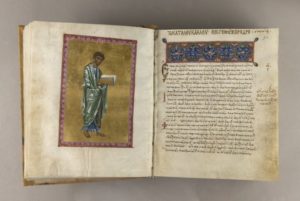 Every New Year countless resolutions are sworn into completion: I want to be more fit‚ I want to lose weight‚ I want to quit smoking‚ I want to speak Spanish‚ and so on. Most of these ambitious dreams‚ however‚ remain just that‚ dreams left behind together with the prepaid fee for the gym program that never happened.
Every New Year countless resolutions are sworn into completion: I want to be more fit‚ I want to lose weight‚ I want to quit smoking‚ I want to speak Spanish‚ and so on. Most of these ambitious dreams‚ however‚ remain just that‚ dreams left behind together with the prepaid fee for the gym program that never happened.
I‚ for one‚ have always enjoyed taking the challenge of learning a new language and so I’ve been trying to learn proper Greek for a while but‚ somehow‚ the mastering of this tongue continues to elude me‚ despite my best efforts. I even prayed for it with no success‚ well‚ it was mostly my fault. See‚ many years ago‚ before my ordination‚ I visited the Holy Mountain Athos and I was gifted there an icon of St. Ephraim. Being named Vasile‚ after St. Basil the Great‚ I knew the touching story of St. Basil conversing in Greek with Saint Ephraim the Syrian who spoke Syriac at his turn and I always wondered how they completely understood each other in the Spirit. I was even more amazed when St. Basil blessed St. Ephraim and‚ upon his blessing‚ he actually started immediately to speak Greek. So‚ upon my return‚ I put the new icon in my prayer corner and prayed to St. Ephraim to help me learn Greek. As I started learning the alphabet and some words‚ with the loving help of a few wonderful people around me‚ at some point I was able to read the Greek inscription on my icon‚ now a few years old‚ and‚ to my surprise‚ I discovered that I was praying to the wrong saint! The icon I received was not of St. Ephraim the Syrian‚ but of St. Ephraim the Newly revealed of Nea Makri… I guess getting lost in translation is a real thing.
Embarrassing story aside‚ learning a language requires not just memorization and dedication‚ it also requires a certain level of immersion and this is where I think I fell short. Immersion means to be completely under the surface of a liquid. Language immersion puts you as well in a place that doesn’t give you a chance to go back to what you know and are familiar with‚ like English. Once immersed you have to do everything in the new idiom you are trying to learn. At the beginning‚ simple things became suddenly painstakingly difficult and nothing can be taken for granted. In such an environment one is led to become more attentive‚ the senses are sharpening and unprompted connections start forming. Soon enough though‚ the difficult becomes gradually simpler‚ the unfamiliar becomes ordinary and communication just happens. What was gibberish some time ago now is coherent conversation and most desired understanding.
In a way‚ learning to speak God’s language‚ to really understand our faith‚ takes a similar process. Since we perform infant baptism‚ faith is a complete blur to begin with. Is something that our parents and God parents surround us lovingly with‚ but is something that does not yet makes sense. It sounds good‚ it tastes good‚ it smells good‚ but we don’t really get it. Then‚ as we grow and we go more to Church‚ to Sunday School‚ we observe our parents‚ we start getting it bit by bit‚ until‚ without realizing it‚ we find ourselves fluent‚ living our faith with understanding.
What helps the most in this process of divine language absorption is that everything around us: the churches‚ the icons‚ the Scriptures‚ the sermons‚ the psaltic music‚ the vestments‚ the incense‚ the Holy Communion‚ all speak the same language. They all May communicate it in a different way‚ but they understand each other perfectly‚ like St. Basil and St. Ephraim. They all speak profoundly the same Mother’s tongue and the Mother is the Church.
Immersed in the Liturgical space of the Church‚ one looses communication with the created and learns‚ in time‚ with perseverance and patience‚ to communicate with the Uncreated. “Unceasingly pray” says the Apostle Paul ; prayer is the language of God. We can pray in English‚ Greek‚ Russian‚ Romanian‚ we can worship God in hymnology or in the colors of the icons‚ at the end they are all attempts to communicate with Him. Each one is a different (imperfect) form of reveling to us Who God is‚ and‚ together‚ they start a coherent conversation that can take place only here‚ where this full immersion happens. Dissociating them‚ or taking them out of the context of the Body of Christ‚ will generate huge gaps in understanding.
Take the icon out of the Church’s space‚ put it in a museum‚ and it losses meaning. The people who come to see it admire the form‚ but fail to understand its meaning‚ fail to see Christ glorified in the midst of the Saints. Put the icon of Christ back in the Church and the koinonia‚ the Communion of the people of God is revealed. Take the Byzantine melody out of the psaltiri‚ chant it in a concert hall and it will convey an ancient heritage to the audience‚ maybe a strange oriental vibe‚ but it will fail to make known the angelic choir that unceasingly praises God together with the people during Divine Liturgy. Take even the Gospel and try to convey the Good Tidings to everyone‚ and you will soon realize that many will misunderstand it‚ many will criticize it and many will even try to change it.
The language spoken inside the Church is not very well understood by the people outside. This is nothing new however‚ Christ‚ God Himself experienced this‚ and continued preaching and healing the people of Israel who rejected Him. The hope remains‚ that‚ even with this gap in understanding‚ some will hear the message and will decide to come in and agree to be immersed for a full understanding. Interestingly enough‚ the Greek word for immersion is actually baptism‚ “so‚ there you go”.
This is why the Orthodox Church’s missionary motto was always “come and see”. We have no marketing‚ we offer no easy scenario of salvation in Christ‚ we promise no mansions‚ only an open invitation to come in. Once you’re in the Church‚ everything here points to Christ in a way that is not superficial‚ is not just lip talk‚ but real life. What is missing from the language of the secular world‚ with all its theories‚ and sciences and logic‚ is the ascetical dimension of a life lived in Christ. The conversation we have with God inside the Church is not just empty theorizing‚ but is leading us to a better understanding of Him so that we could be transformed in His Image. This is what askesis is: training‚ preparation for a total transformation. How about that as a New Year resolution?
Lost in New Year Resolutions‚
Your website contains the Small Compline service I’ve been looking for‚ and I’ve found x. other helpful things here‚ including last Sunday’s sermon. I’d like to visit here frequently.
– Laura Woods‚ member of St. Andrew Greek Orthodox Church‚ Miami‚ FL